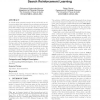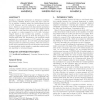141 search results - page 15 / 29 » Fuzzy Kanerva-based function approximation for reinforcement... |
90
Voted
NIPS
1994
15 years 28 days ago
1994
It is widely accepted that the use of more compact representations than lookup tables is crucial to scaling reinforcement learning (RL) algorithms to real-world problems. Unfortun...
112
click to vote
ICML
2003
IEEE
15 years 4 months ago
2003
IEEE
Reinforcement learning has been used for training game playing agents. The value function for a complex game must be approximated with a continuous function because the number of ...
ATAL
2009
Springer
15 years 6 months ago
2009
Springer
In several agent-oriented scenarios in the real world, an autonomous agent that is situated in an unknown environment must learn through a process of trial and error to take actio...
121
click to vote
IWLCS
2005
Springer
15 years 5 months ago
2005
Springer
Aiming to clarify the convergence or divergence conditions for Learning Classifier System (LCS), this paper explores: (1) an extreme condition where the reinforcement process of ...
89
Voted
NIPS
2001
15 years 1 months ago
2001
Policy gradient methods for reinforcement learning avoid some of the undesirable properties of the value function approaches, such as policy degradation (Baxter and Bartlett, 2001...


